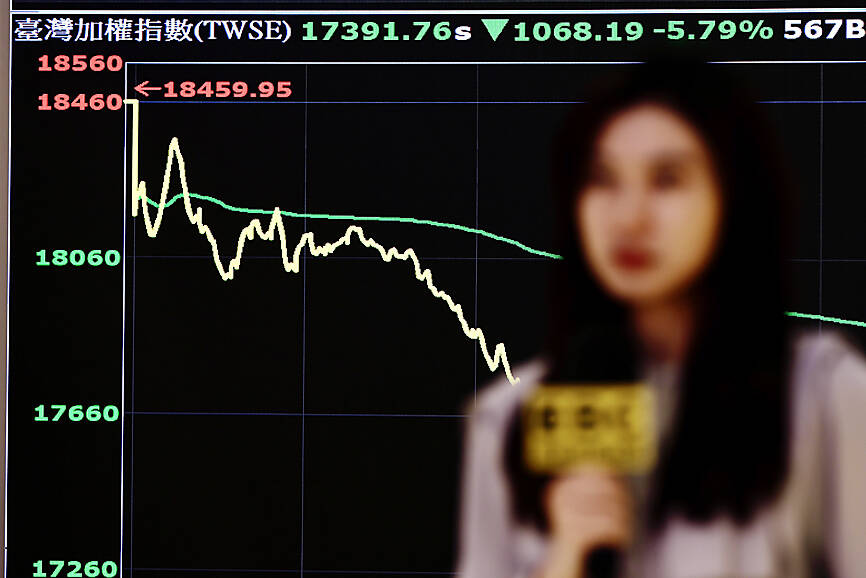Taiwanese stocks continued their heavy sell-off yesterday, as concerns over US tariffs and unwinding of leveraged bets weighed on the market.
The benchmark TAIEX plunged 1,068.19 points, or 5.79 percent, to 17,391.76, notching the biggest drop among Asian peers as it hit a 15-month low.
The decline came even after the government on late Tuesday authorized the NT$500 billion (US$15.2 billion) National Stabilization Fund (國安基金) to step in to buoy the market amid investors’ worries over tariffs imposed by US President Donald Trump.

Photo: Ritchie B. Tongo, EPA-EFE
Yesterday’s decline was the third-steepest in its history, trailing only the declines of 2,065.87 points on Monday and 1,807.21 points on Aug. 5 last year, Taiwan Stock Exchange data showed.
The TAIEX has shed 18 percent this week and is now the world’s worst-performing major equity gauge this year.
Nearly all of the index’s 1,000-plus members fell. Taiwan Semiconductor Manufacturing Co (TSMC, 台積電), the gauge’s top-weighted member, dropped 3.8 percent. Hon Hai Precision Industry Co (鴻海精密) fell by a limit of 10 percent and MediaTek Inc (聯發科) lost 5.95 percent.
While shares usually rebound after the NSF’s activation, the market’s decline yesterday is “largely due to the big unwind of leveraged bets still pressuring the index,” Taishin Securities Investment Advisory Co (台新投顧) vice president Huang Wen-ching (黃文清) said. “The market is still digesting this, while US stocks also did relatively poorly overnight.”
Traders have rushed to reverse their leveraged bets amid the stock rout this week. Their unwinding accelerated on Tuesday, with the level of margin debt dropping by NT$28.5 billion, the most since July 1999, according to exchange data compiled by Bloomberg.
Turnover on the main board increased to NT$566.607 billion yesterday, compared with NT$548.951 billion the previous session, exchange data showed.
“Look at the expanded turnover, I think the main board was hit hard by panicked selling as investors were shocked by Trump’s announcement overnight with China showing no signs of backing down,” MasterLink Securities Corp (元富證券) analyst Tom Tang (湯忠謙) said.
The presence of the stabilization fund failed to stem the bleeding much, as the selling pressure was very significant, Tang said.
“Due to the steep decline in recent sessions, many investors have faced margin calls [to add money to their margin accounts] to trigger more selling,” Tang said. “I think the market is far from stable, so stay cautious.”
Taiwanese authorities have deployed various measures to shore up the equity market after Trump’s new tariffs triggered heightened volatility.
The financial regulator has tightened its rules on short-selling, which went into effect on Monday and run through tomorrow. It also increased margin requirements and narrowed the limit on daily short selling volume.
The tariff rate of 32 percent on Taiwan is among the highest imposed on Asian economies, which would take a toll on the nation’s economy as it relies heavily on exports — especially tech-related products — to the US.
Additional reporting by CNA

Merida Industry Co (美利達) has seen signs of recovery in the US and European markets this year, as customers are gradually depleting their inventories, the bicycle maker told shareholders yesterday. Given robust growth in new orders at its Taiwanese factory, coupled with its subsidiaries’ improving performance, Merida said it remains confident about the bicycle market’s prospects and expects steady growth in its core business this year. CAUTION ON CHINA However, the company must handle the Chinese market with great caution, as sales of road bikes there have declined significantly, affecting its revenue and profitability, Merida said in a statement, adding that it would

RISING: Strong exports, and life insurance companies’ efforts to manage currency risks indicates the NT dollar would eventually pass the 29 level, an expert said The New Taiwan dollar yesterday rallied to its strongest in three years amid inflows to the nation’s stock market and broad-based weakness in the US dollar. Exporter sales of the US currency and a repatriation of funds from local asset managers also played a role, said two traders, who asked not to be identified as they were not authorized to speak publicly. State-owned banks were seen buying the greenback yesterday, but only at a moderate scale, the traders said. The local currency gained 0.77 percent, outperforming almost all of its Asian peers, to close at NT$29.165 per US dollar in Taipei trading yesterday. The

RECORD LOW: Global firms’ increased inventories, tariff disputes not yet impacting Taiwan and new graduates not yet entering the market contributed to the decrease Taiwan’s unemployment rate last month dropped to 3.3 percent, the lowest for the month in 25 years, as strong exports and resilient domestic demand boosted hiring across various sectors, the Directorate-General of Budget, Accounting and Statistics (DGBAS) said yesterday. After seasonal adjustments, the jobless rate eased to 3.34 percent, the best performance in 24 years, suggesting a stable labor market, although a mild increase is expected with the graduation season from this month through August, the statistics agency said. “Potential shocks from tariff disputes between the US and China have yet to affect Taiwan’s job market,” Census Department Deputy Director Tan Wen-ling

UNCERTAINTIES: The world’s biggest chip packager and tester is closely monitoring the US’ tariff policy before making any capacity adjustments, a company official said ASE Technology Holding Inc (日月光投控), the world’s biggest chip packager and tester, yesterday said it is cautiously evaluating new advanced packaging capacity expansion in the US in response to customers’ requests amid uncertainties about the US’ tariff policy. Compared with its semiconductor peers, ASE has been relatively prudent about building new capacity in the US. However, the company is adjusting its global manufacturing footprint expansion after US President Donald Trump announced “reciprocal” tariffs in April, and new import duties targeting semiconductors and other items that are vital to national security. ASE subsidiary Siliconware Precision Industries Co (SPIL, 矽品精密) is participating in Nvidia